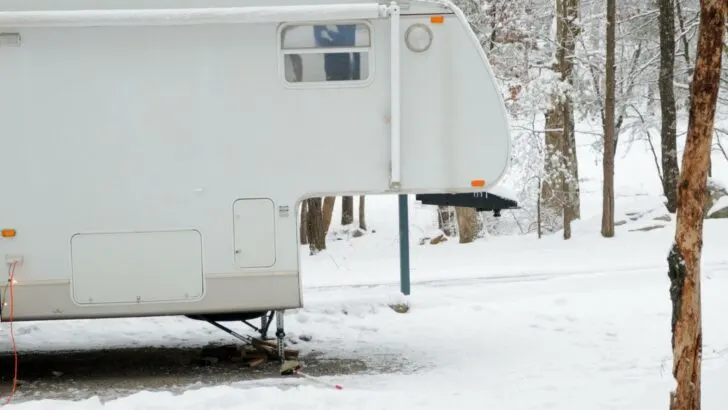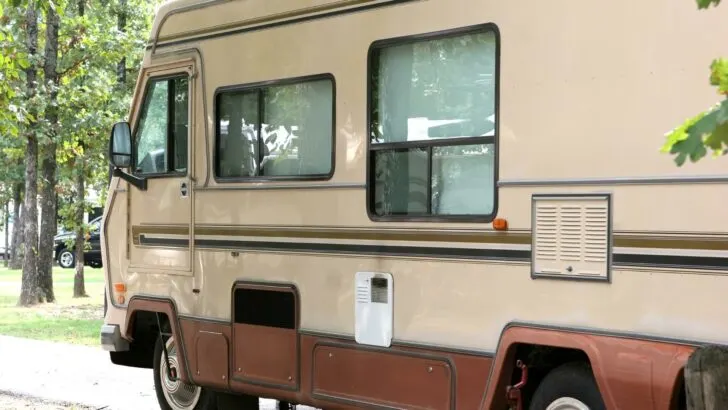How familiar are you with your RV’s manufacturer warranty coverage? Is your RV warranty enough to protect you from a substantial repair bill in the event that your rig requires major repairs? If so, for how long is this extent of RV warranty coverage available to you?
These are important questions to understand when you’re buying an RV.
Today we’re looking at the RV warranty. What does it cover and is it enough to protect you?
- 1) My RV is Brand New – Why Should I Be Concerned About the Warranty?
- 2) What Do Most RV Warranties Cover?
- 3) What Does an RV Warranty NOT Cover?
- 4) How Long Is a Warranty on a New RV?
- 5) Should I Buy the Extended Warranty on an RV?
- 6) Can You Buy Extended Warranty on a Used RV?
- 7) So Tell Us – How Has Your RV Warranty Worked Out for You?
My RV is Brand New – Why Should I Be Concerned About the Warranty?
We all know that RV repairs can be expensive. And many of us know that even brand-new RVs can have issues. In fact, it’s not unusual for owners of new RVs to discover some problems as soon as they’ve taken the rig off the lot and onto the road.
Owners of 5th wheels, travel trailers, truck campers, and the like need to understand the RV warranty coverage that is extended by the manufacturer for the repair of certain mechanical items. This includes “house” components such as major appliances, plumbing, tanks, windows, and even the structure of the RV itself.
With motorhomes, we have to be aware of warranty coverage for all of the above plus coverage of engine and transmission issues and other potential mechanical failures.
For all of these reasons, RV owners need to be well-informed when it comes to their RV warranty.
What Do Most RV Warranties Cover?
It’s difficult to discuss specifics related to RV warranties because they’re not all created equal. But there are some things that most RV warranties cover.
Notice that we didn’t say ALL RV warranties — we said most. As always, there are sure to be exceptions. This is why it’s imperative that you gain an understanding of YOUR RV manufacturer’s warranty coverage before you even sign on the dotted line to buy the rig.
If you have questions, most quality RV dealerships have customer service representatives who can guide you toward a clearer understanding of what’s covered – and what’s not. Don’t be afraid to reach out to them for specifics. Don’t wait until you have an issue to find out whether it’s covered. Nobody likes those kinds of surprises!
With all of that said, and with an understanding that generalizations are approximate, let’s take a look at what most RV warranties cover.

Most RV warranties cover components that fail under normal use for the duration of the stated warranty coverage period.
It’s very likely that your RV warranty covers the failure of RV components under conditions of normal use for the duration of time that the warranty is active.
So, for example, if your RV slides fail under normal use during the warranty period, they’re likely to be covered under the warranty. However, if you pull away from a campsite having forgotten to bring in a slide and you hit a tree branch, that damage wouldn’t be covered under the general warranty plan.
The same is true of your RV appliances, generator, plumbing, etc. Under normal use, if they fail during the warranty period, they’ll be covered.
This is also true of your RV’s structural components such as windows, skylights, and the RV’s walls, floors, and exterior structures (sides, roof, undercarriage, axles, etc.)
Your electric and/or hydraulic jacks and leveling jacks should be included as well. And if you’ve got a motorhome, powertrain components (engine and transmission) would also be covered.
But remember – this is coverage that lasts for a stated period of time. This duration of time can differ from RV manufacturer to RV manufacturer and is something you need to be aware of going into an RV purchase.
It’s also important to understand that all warranties are different. If you’re an RVer who travels far and wide as we do, you’ll want to make sure your warranty covers repairs wherever you are.
If you travel to the same place year after year, this feature may be of less importance to you, but you still want to make sure your RV warranty will cover the repair shop or even a mobile RV repair technician you may want to use when the time comes.
Don’t be afraid to ask questions!
What Does an RV Warranty NOT Cover?
An RV warranty is not an insurance policy. So, if you damage the RV either in an accident or other type of mishap, your RV warranty is highly unlikely to cover the damage.
For example, if you have an RV that, with the AC unit and other equipment on the roof, is 9 feet tall and you go through a drive-through that’s 8 feet 6 inches, you just got yourself one expensive box of french fries because your RV warranty is not going to pay the repair bill. You’ll have to deal with your insurance company for incidents like this.
We’ll repeat here – an RV warranty covers components that fail under normal use. It doesn’t cover accidents, nor does it cover failures if you caused the damage.

An RV warrant does not cover components that fail due to neglect or improper maintenance or care.
An RV warranty also doesn’t cover components that fail due to neglect. If you fail to follow your manufacturer’s suggested maintenance on your RV and something fails due to that neglect, the manufacturer is not required to cover it under their warranty.
For example, if you fail to winterize your RV and it sits in sub-freezing temperatures in Maine for 5 months, don’t expect your RV’s warranty to cover your cracked water pump or plumbing fittings, damage from burst pipes, or damaged water heater.
We are responsible for properly maintaining our RVs. If we fail to do so, damage resulting from that neglect is not covered by an RV warranty.
How Long Is a Warranty on a New RV?
Again, this varies, but most new RV warranties fall within the range of 2-3 years. Having said that, however, there are some RV manufacturers that provide a 1-year warranty period.
You can usually find this information very easily on the website of the RV manufacturer.
It’s also important to note that RV manufacturers offer various types of warranties to buyers. Some are limited warranties and may cover only certain components. But structural warranties usually are for a period of either 2 or 3 years from the original purchase or delivery date.
Following are the warranty periods for many of the major RV manufacturers, alphabetized for your reference and convenience.
- Airstream: 3-year limited warranty; 3 years of 24/7 roadside assistance
- Bigfoot RV: 3-year structural warranty; 1-year warranty for all standard items
- Casita: 1 year
- Crossroads RV: 3-year limited structural warranty
- DRV Luxury Suites: 3-year limited warranty
- Dutchman: 3-year structural warranty; 1-year warranty for all standard items
- Entegra: 5-year structural limited warranty; 2-year limited warranty
- Escape Trailers: 2-year warranty
- Fleetwood RV: 3-year/45,000-mile structural warranty; 1-year/15,000-mile limited warranty
- Forest River: 1-year structural warranty
- Gulfstream: 3-year limited warranty on Ultra-Lite structural components; 1-year warranty on Super-Lite structural components
- Heartland: 3-year limited structural warranty; 1-year limited warranty
- Holiday Rambler: 3-year/45,000-mile limited structural warranty; 1-year/15,000-mile basic limited warranty
- Jayco: 2-year limited warranty
- Keystone: 3-year limited structural warranty; 1-year limited base warranty
- Lance: 2-year limited structural warranty; 1-year limited warranty
- Leisure Travel: 3-year/36,000-mile limited structural warranty; 2-year/24,000-mile limited warranty
- Monaco: 3-year/45,000-mile limited structural warranty; 1-year/15,000-mile basic limited warranty
- Newmar: 5-year limited structural warranty; 1-year limited warranty
- Roadtrek: 6-year unlimited-mile limited warranty
- Thor: 1-year limited warranty
- Tiffin: 10-year construction limited warranty, 5-year delamination limited warranty; 1-year limited warranty; 1-year coach roadside service
- Winnebago: 10-year limited parts-and-labor fiberglass roof warranty; 3-year/36,000-mile limited structural warranty;
1-year/15,000-mile basic limited warranty
Should I Buy the Extended Warranty on an RV?
Many RV manufacturers and third parties offer RV buyers/owners the opportunity to purchase an RV extended warranty.
Whether you purchase an extended warranty through the manufacturer of your rig or through a company that offers aftermarket warranties, some type of extended service contract can offer peace of mind.
We should note here that the term “extended warranty” is a bit of a misnomer. In truth, what you’re purchasing is an extended service contract, in essence, self-insuring your RV.
These types of contracts, (which are regularly referred to in the industry as “extended warranties”), often contain language that binds the purchaser to particular actions related to service and maintenance.
So, your extended service contract may state that you’re required to complete certain maintenance tasks deemed by the manufacturer to be necessary or beneficial to the RV’s care over time. Should you miss such a required service, depending on the language in your service contract you could be relieving the provider of any responsibility to pay for necessary repairs.
For this reason, extended warranties/extended service contracts should be read very carefully and understood prior to purchase.
It may be important to note that people often have either a love or hate relationship with extended warranties/service contracts. There’s some part of the decision to purchase one (or not) that is seated in personal philosophy and personal conviction.
We know many people who buy an extended service contract without fail, and we know many others who choose instead to put away what money they’d pay for an extended warranty for potential repairs down the line.
We fit into that latter category having never purchased any type of extension after our initial warranty ended. We choose to repair as much as possible ourselves, and “save for a rainy day” for things beyond our ability. There are some mechanical components that we’re simply going to take to a repair facility, but that’s paid for with the money we’ve saved by not buying an extended warranty plan. This attitude may work particularly well for DIY RVers, like us.
Of course if you’re going to work on your own RV, you’ll want to be sure to keep a well-stocked tool kit on board.
- HIGH QUALITY&STANDARDS:Forged from high-quality steel and finished in high-polish chrome,strength, durability, anti-corrosion protection.All the tools...
- COMPLETE VARIETIES:Contains tools needed for most small repairs and basic DIY projects around the house.Perfect for Handyman’s, repairmen,...
Neither approach is right or wrong as long as it serves your needs.
For much more information on extended warranties, please see our post entitled, “Is an Extended RV Warranty Worth It?”
Can You Buy Extended Warranty on a Used RV?
Extended warranties/extended service contracts MAY be available on your used RV depending on how old it is and other factors.
If your RV is just old enough to have passed the manufacturer’s warranty period, there’s definitely an extended warranty out there for you if that’s your desire. You’ll either be able to purchase it through the manufacturer of your RV or independently through a wholesale warranty company.

You can find extended service contracts for older RVs. However, if your rig is more than 20 years old or has more than 100,000 miles on the clock, you’ll have significantly more difficulty finding a company that will offer you a contract.
If, however, your RV is significantly older, you’ll need to do some shopping and it’s possible that you won’t find a service contract that suits your situation.
In the way of example, a company like Wholesale Warranties requires that a motorhome must be less than 20 years old (the model age) with less than 100,000 miles on the odometer. Towable rigs must be 15 (model) years old or less.
Note: We’re not endorsing this particular company but simply offering it as an example of one that offers extended warranties to owners of older RVs and what their parameters are.
So Tell Us – How Has Your RV Warranty Worked Out for You?
Has your RV warranty served you when you needed it? Share the pros and cons of your experiences in a comment below.
Geek Out With Us Every Week
Join our newsletter to learn about all things RV-related. Every week we offer free tips, tricks, product reviews, and more to our online community of RVers. So, whether this is your first time on the road or you’re a seasoned expert, we’d love for you to geek out with us!



Bob Pratt
Saturday 6th of January 2024
The wall on my slide side failed. Winnebago 2108 FBS. When I pursued warranty repair, I was told that my small bike rack on the rear bumper voided my structural warranty. So,,, worthless!!
TheRVgeeks
Saturday 6th of January 2024
Sorry to hear, Bob. Thanks for sharing your experience.
Ron
Friday 20th of October 2023
We purchased our extended service contract through the RV dealer when we bought our new Forest River travel trailer. It has been a money saver. We've owned our unit since 2019 and it had a 1 year manufacturer structural warranty. In the years following We've had to replace several components including the slide motor, the rails. Our water pump, the Murphy bed among other things. All we paid was $100 deductible each time we brought it in for repairs. We've learned to wait until several things need work before bringing it to the shop thereby saving on the number tof deductibles we pay out.
TheRVgeeks
Tuesday 24th of October 2023
Glad to hear your extended warranty is working so well for you, Ron! And great idea to bundle repairs together to minimize deductibles! 💸💰💵
Hank
Friday 20th of October 2023
I noticed that you didn’t list Grand Design within your list of manufacturers warranty periods? This is not the first time that one of your lists of RV manufacturers has not included Grand Design. Just curious why they seem to be omitted. They are one of the larger companies.
TheRVgeeks
Tuesday 24th of October 2023
Just an oversight, Hank. We were merely listing a subset of manufacturer warranties... and Grand Design just slipped our mind. We'll try to do better in the future! 😉
Ray Davis
Friday 20th of October 2023
@Hank, I notice that as well.It may be under the umbrella of Winnebago who is now the parent company.
Neal Davis
Thursday 27th of October 2022
Bought an extended warranty covering "everything" from CoachNet. Used it several times and were very pleased with the extent of their coverage and the level of compensation/coverage. Likely will buy from them again when Newmar's warranty on our 2022 New Aire 3545 lapses. (Not sure you'd like having a New Aire, is MUCH smaller than our 43'American Revolution.)
TheRVgeeks
Friday 28th of October 2022
Great to hear, Neal... especially the part about owning a '22 New Aire. ???? We'd still like to downsize.
Revbucco
Saturday 22nd of October 2022
I’m not sure this is the place to call out and the individual company that made my RV nor the company that sold me my RV… But I had a pretty bad experience with a 5th Wheel that I bought brand new from a recognized dealership from a recognized RV company.
I will get to warranties, but I need to give you some background first.
I found many things wrong on my brand new RV. First week I had my RV I walked outside to do my first dump of my tanks. The ground was wet and I began looking for where the water was coming only to notice that the sealed underbelly was sagging. When I pushed on it the underbelly it moved around like a waterbed.
Called the dealer and was told to take it to the nearest same dealer. I will spare you a ton of excruciating detail but 3 months later I finally received my RV back.
The hold up was that the dealer had to contact the ‘maker’ for warranty approval. They would go back forth, over and over. Many times the ‘maker’ would invoke that the company (fabricator) that made the part was responsible and the dealership would have to resubmit a claim directly with the fabricator. All the while the purchaser is left to hang, making his monthly payments while the dealership haggles between fabricator and ‘maker’.
Would love to say this was my only bad experience. When your rig is in the shop and you go over to check on it you get close to the techs who are working on it. They spill the beans on the issues that face the RV Industry faces. Many big name ‘makers’ will churn out their rigs KNOWING that their rigs will need tweaking when they arrive at the dealerships. The dealers sell the RVs doing no tweaks and wait until the purchaser brings it to their attention.
My suggestion is NEVER buy an RV new—only buy used and hope the other guy got all the tweaks fixed!
My warranty was worthless. Sure hope yours was better!